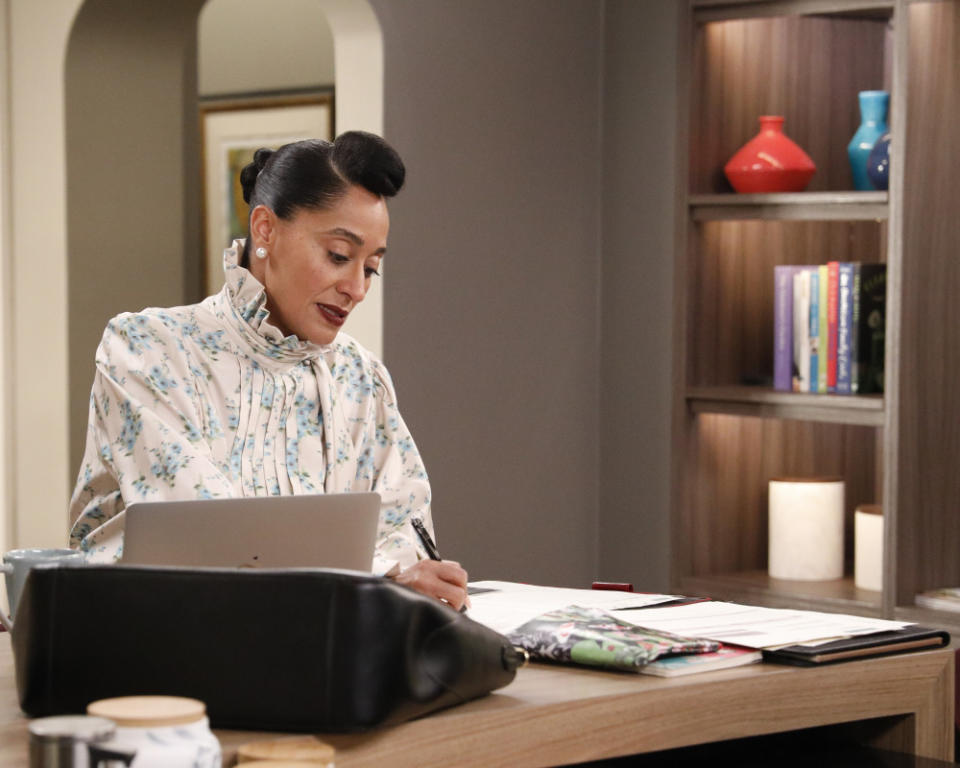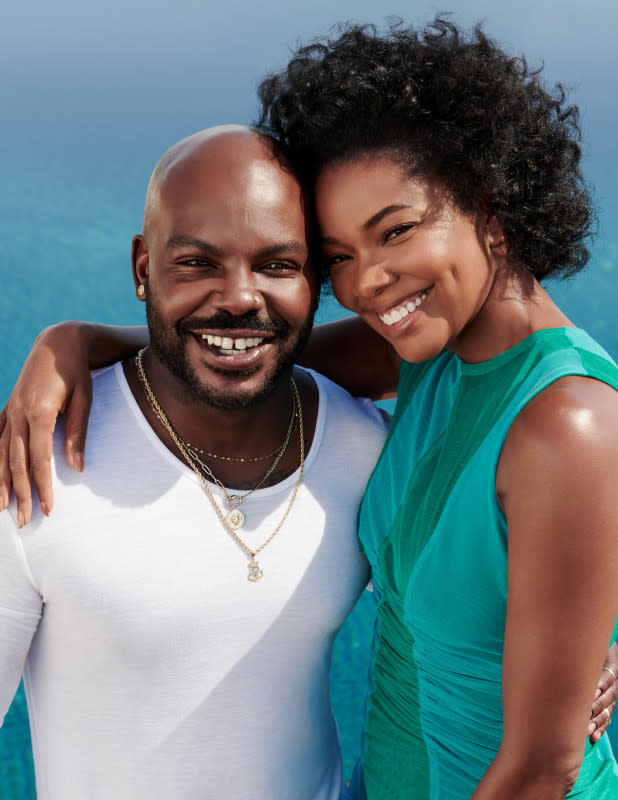Hollywood Promised to Hire More Black Hairstylists. Did the Industry Listen?
Black actors in Hollywood face plenty of challenges in an industry and culture that has systemically excluded, neglected and undervalued them. One such challenge — that actors themselves have become more vocal about in recent years — is extreme dearth of Black hairstylists on set, as well as the lack of training when it comes to the stylists who are on set.
In a 2020 interview, "Chilling Adventures of Sabrina" actor Jaz Sinclair shared that she'd had to sit down with series executives after the show's first season to advocate for getting the hair care she needed. The same year, "The Bold Type" actor Aisha Dee revealed in an Instagram post that "it took three seasons to get someone in the hair department who knew how to work with textured hair." The following year, "High School Musical" star Monique Coleman came forward, stating the reason that her character Taylor McKessie had worn so many headbands was that the crew did her hair "poorly" in the front and the accessory was hiding that fact.
Both Gabrielle Union and Tracee Ellis Ross have been open about the years of struggles they've faced throughout their careers when it came to hair on set — experiences both have cited as driving factors behind the creation of their own hair-care brands. In a prior interview with Fashionista, Union recalled ??"people always having an opinion on what [her] hair should and shouldn't look like" and said that part of creating an anti-racist beauty industry means "hiring Black people in front and behind the scenes." Ross told the The Los Angeles Times in 2018 that, during her time on the long-running series "Girlfriends," she woke up three hours before call time to do her own hair — partly because there weren't stylists on set who knew how to work with her natural texture.
"Most Black actresses come to set with their hair done or bring their wigs and clip-ins with them," actor Yvette Nicole Brown wrote in a viral tweet. "It's either that or take a chance that you will look crazy on screen."
As more Black talent came forward regarding their experiences — especially amid the rise of the Black Lives Matter movement and broader conversations surrounding diversity and inclusion in 2020 — Hollywood could no longer ignore the reality that it needed to step it up and start hiring more Black hairstylists (in addition to making many other changes, of course). Major entertainment studios issued statements of solidarity, promising to implement DEI training and pledging to promote diverse and inclusive initiatives at various levels, including in the beauty departments on their sets.
So now, several years later, the question is: Are things improving?

Photo: Raymond Liu/Getty Images
"You've seen the change," hairstylist Dennis Bailey (whose credits include "Saturday Night Live," "The Deuce," "Boardwalk Empire" and the new "Mean Girls") tells Fashionista. "You see a lot more Black department heads than there were prior to 2020." He adds that the uptick in "Black content" — meaning "shows that gauge towards African-American [audiences]" has also created a ripple effect throughout the industry, with more Black talent being hired on these projects in general.
Hairstylist Derrick Kollock, who was the department head for films such as "So Fly Christmas," "Mother's Instinct," "Rob Peace" and "Ezra," agrees, with a caveat: While he admits there's still "that little gang of Karens that's in the trailer hardly doing any work," he does say he's seen "a lot more Black department heads" and "more Black and brown people on set doing hair and makeup, period" over the past few years.
The role department heads play in driving more diverse representation in the trailers is significant: More often than not, they are the ones tasked with hiring the remaining hair and makeup crew — and with great power, comes great responsibility.
"In order to run the successful department where everybody's happy, you have to fill the trailer with talented artists that can accommodate everybody, and it's just not being done in that way," says celebrity hairstylist Larry Sims, whose clients include Gabrielle Union, Janet Jackson, Danai Gurira, Alexandra Shipp, Jaz Sinclair, Kerry Washington and Lupita Nyong'o. (He is also the co-founder of Union's brand, Flawless by Gabrielle Union.)
Where barriers arise is when department heads "hire their friends," Sims explains. "There's this inner circle of people that hire just their own people, and they hire their own people because they want their own people to eat without consideration of what's best for Black and brown people."

Photo: Courtesy of Larry Sims
There has also been recent progress towards improving natural hair education and inclusion on set on an official, structural level: After reaching an agreement following the SAG-AFTRA strike of 2023, the new contract included a "Hair and Makeup" provision within the "Equity & Inclusion" that prioritizes adequate hair and makeup care for performers of all races and ethnicities, involving official trade associations like the Alliance of Motion Picture and Television Producers (AMPTP) and International Alliance of Theatrical Stage Employees (IATSE):
"1. Each principal performer shall be given the opportunity to meaningfully consult regarding any hair and makeup needs so that production is prepared to work with the performer, including having appropriate hair and makeup products and equipment. If the producer is unable to provide qualified hair and/or makeup personnel to work with the performer, production shall reimburse the performer for the pre-approved cost of obtaining such services. The performer will also be entitled to no less than two hours of compensation for the time spent in such services.
2. The AMPTP will also issue a bulletin to represented producers regarding the requirement to offer hair and makeup consultations to performers.3. The parties will add a sideletter to the agreement reflecting a commitment to meet with IATSE to discuss efforts to expand and maintain the pool of hair stylist and makeup artists who are qualified and available to work with people of all races and ethnicities. The parties will also recommend to the trustees of the IACF to fund training of hair stylists and make-up artists to acquire the skills necessary to work with all hair textures and skin tones.
For aspiring Hollywood hairstylists, Kollock advises that joining a union is a crucial step toward getting a foot in the door and feeling supported early on in your career. (In Los Angeles, Local 706, or The Make-Up Artists & Hair Stylists Guild, is the labor union to join to work in film, television and stage. Meanwhile, Local 798 is the official union for similar projects located in various East Coast locations.)
Besides the obvious fix of hiring more Black hairstylists on set, it's also crucial to set expectations that all hairstylists, regardless of their own race or ethnicity, receive the proper education and training to be able to work with any actor.
"Education is a must when it comes to this because that's what's going to separate you from the rest," says Kim Kimble, a natural hair educator and celebrity hairstylist who has worked with Beyoncé, Zendaya, Mary J. Blige and Storm Reid. "If you work in television and film, you need to know how to work with all types of hair because you're going to get all types of clients…I think that's definitely the prerequisite for working in the industry. You need to know how to deal with it all."
This is ideal has become increasingly recognized outside Hollywood, too, with significant legislative steps being made toward requiring more inclusive hair education for everyone. In November 2023, Governor Kathy Hochul officially signed New York Senate Bill S6528A into law, requiring cosmetologists to complete training working with all hair textures in order to obtain a cosmetology license. (This law, of course, applies only to the state of New York, but it is being championed as a major step forward and will no doubt have its own impact on the entertainment industry as well.)
On the whole, the Black beauty professionals Fashionista spoke with for this story remain optimistic for where things are heading, and especially so when it comes to the next generation.
"Our hair is so powerful. We tell so many stories through the construction of our styles that we create," says Sims. "We are trendsetters. We are amazingly creative... I just think that the sky's the limit for us. It's about really, at the end of the day, breaking through barriers and not taking no for an answer."
Want the latest fashion industry news first? Sign up for our daily newsletter.
